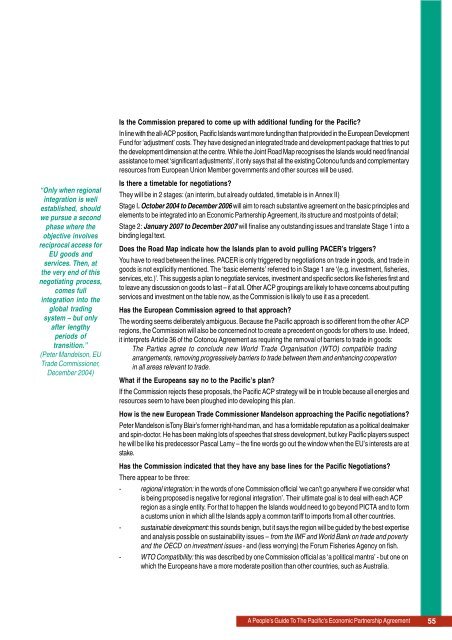REPA Booklet - Stop Epa
REPA Booklet - Stop Epa
REPA Booklet - Stop Epa
You also want an ePaper? Increase the reach of your titles
YUMPU automatically turns print PDFs into web optimized ePapers that Google loves.
Is the Commission prepared to come up with additional funding for the Pacific?<br />
In line with the all-ACP position, Pacific Islands want more funding than that provided in the European Development<br />
Fund for ‘adjustment’ costs. They have designed an integrated trade and development package that tries to put<br />
the development dimension at the centre. While the Joint Road Map recognises the Islands would need financial<br />
assistance to meet ‘significant adjustments’, it only says that all the existing Cotonou funds and complementary<br />
resources from European Union Member governments and other sources will be used.<br />
“Only when regional<br />
integration is well<br />
established, should<br />
we pursue a second<br />
phase where the<br />
objective involves<br />
reciprocal access for<br />
EU goods and<br />
services. Then, at<br />
the very end of this<br />
negotiating process,<br />
comes full<br />
integration into the<br />
global trading<br />
system – but only<br />
after lengthy<br />
periods of<br />
transition.”<br />
(Peter Mandelson, EU<br />
Trade Commissioner,<br />
December 2004)<br />
Is there a timetable for negotiations?<br />
They will be in 2 stages: (an interim, but already outdated, timetable is in Annex II)<br />
Stage I. October 2004 to December 2006 will aim to reach substantive agreement on the basic principles and<br />
elements to be integrated into an Economic Partnership Agreement, its structure and most points of detail;<br />
Stage 2: January 2007 to December 2007 will finalise any outstanding issues and translate Stage 1 into a<br />
binding legal text.<br />
Does the Road Map indicate how the Islands plan to avoid pulling PACER’s triggers?<br />
You have to read between the lines. PACER is only triggered by negotiations on trade in goods, and trade in<br />
goods is not explicitly mentioned. The ‘basic elements’ referred to in Stage 1 are ‘(e.g. investment, fisheries,<br />
services, etc.)’. This suggests a plan to negotiate services, investment and specific sectors like fisheries first and<br />
to leave any discussion on goods to last – if at all. Other ACP groupings are likely to have concerns about putting<br />
services and investment on the table now, as the Commission is likely to use it as a precedent.<br />
Has the European Commission agreed to that approach?<br />
The wording seems deliberately ambiguous. Because the Pacific approach is so different from the other ACP<br />
regions, the Commission will also be concerned not to create a precedent on goods for others to use. Indeed,<br />
it interprets Article 36 of the Cotonou Agreement as requiring the removal of barriers to trade in goods:<br />
The Parties agree to conclude new World Trade Organisation (WTO) compatible trading<br />
arrangements, removing progressively barriers to trade between them and enhancing cooperation<br />
in all areas relevant to trade.<br />
What if the Europeans say no to the Pacific’s plan?<br />
If the Commission rejects these proposals, the Pacific ACP strategy will be in trouble because all energies and<br />
resources seem to have been ploughed into developing this plan.<br />
How is the new European Trade Commissioner Mandelson approaching the Pacific negotiations?<br />
Peter Mandelson isTony Blair’s former right-hand man, and has a formidable reputation as a political dealmaker<br />
and spin-doctor. He has been making lots of speeches that stress development, but key Pacific players suspect<br />
he will be like his predecessor Pascal Lamy – the fine words go out the window when the EU’s interests are at<br />
stake.<br />
Has the Commission indicated that they have any base lines for the Pacific Negotiations?<br />
There appear to be three:<br />
- regional integration: in the words of one Commission official ‘we can’t go anywhere if we consider what<br />
is being proposed is negative for regional integration’. Their ultimate goal is to deal with each ACP<br />
region as a single entity. For that to happen the Islands would need to go beyond PICTA and to form<br />
a customs union in which all the Islands apply a common tariff to imports from all other countries.<br />
- sustainable development: this sounds benign, but it says the region will be guided by the best expertise<br />
and analysis possible on sustainability issues – from the IMF and World Bank on trade and poverty<br />
and the OECD on investment issues - and (less worrying) the Forum Fisheries Agency on fish.<br />
- WTO Compatibility: this was described by one Commission official as ‘a political mantra’ - but one on<br />
which the Europeans have a more moderate position than other countries, such as Australia.<br />
A People’s Guide To The Pacific’s Economic Partnership Agreement 55
















